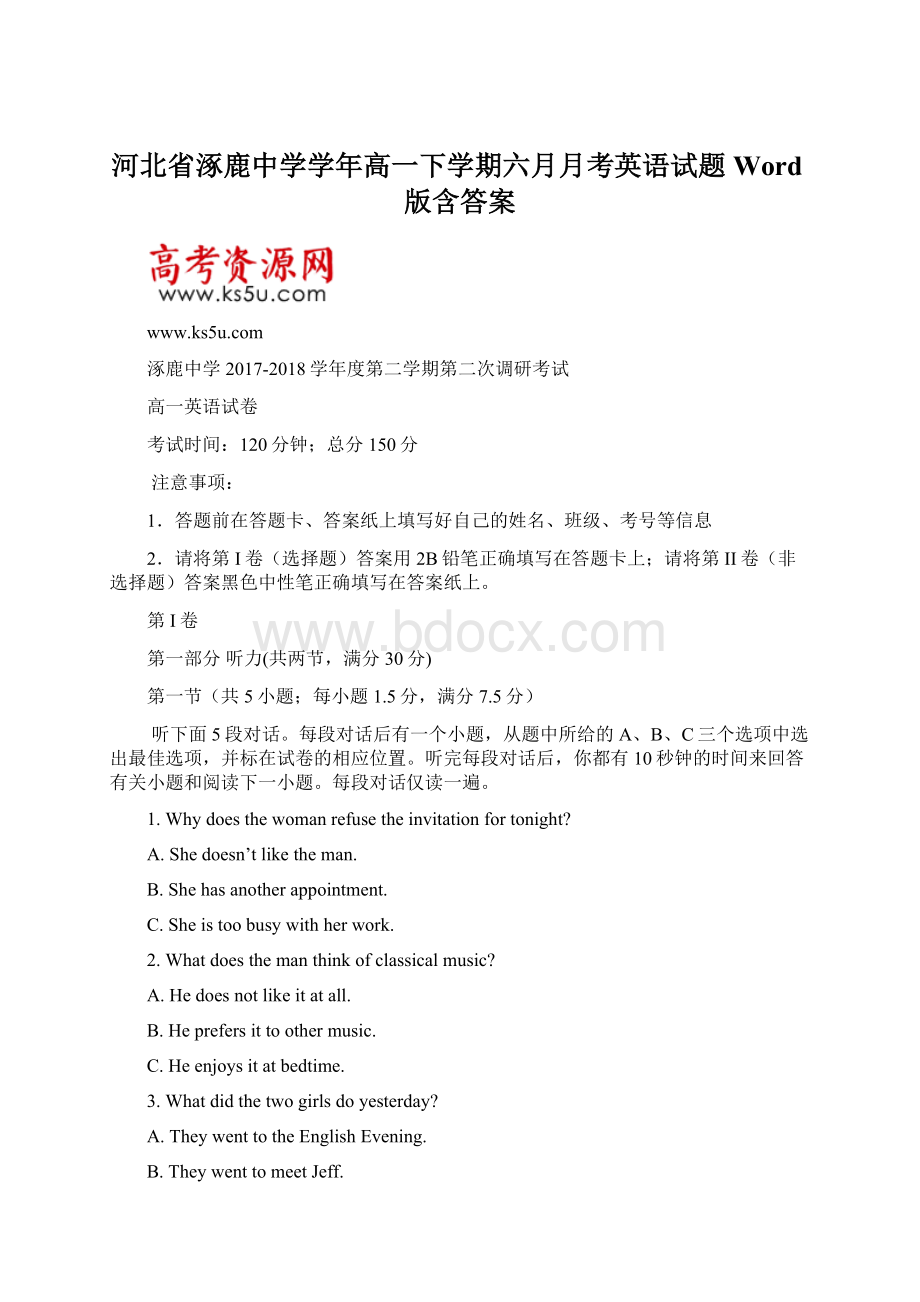河北省涿鹿中学学年高一下学期六月月考英语试题 Word版含答案.docx
《河北省涿鹿中学学年高一下学期六月月考英语试题 Word版含答案.docx》由会员分享,可在线阅读,更多相关《河北省涿鹿中学学年高一下学期六月月考英语试题 Word版含答案.docx(17页珍藏版)》请在冰豆网上搜索。

河北省涿鹿中学学年高一下学期六月月考英语试题Word版含答案
涿鹿中学2017-2018学年度第二学期第二次调研考试
高一英语试卷
考试时间:
120分钟;总分150分
注意事项:
1.答题前在答题卡、答案纸上填写好自己的姓名、班级、考号等信息
2.请将第I卷(选择题)答案用2B铅笔正确填写在答题卡上;请将第II卷(非选择题)答案黑色中性笔正确填写在答案纸上。
第I卷
第一部分听力(共两节,满分30分)
第一节(共5小题;每小题1.5分,满分7.5分)
听下面5段对话。
每段对话后有一个小题,从题中所给的A、B、C三个选项中选出最佳选项,并标在试卷的相应位置。
听完每段对话后,你都有10秒钟的时间来回答有关小题和阅读下一小题。
每段对话仅读一遍。
1.Whydoesthewomanrefusetheinvitationfortonight?
A.Shedoesn’tliketheman.
B.Shehasanotherappointment.
C.Sheistoobusywithherwork.
2.Whatdoesthemanthinkofclassicalmusic?
A.Hedoesnotlikeitatall.
B.Heprefersittoothermusic.
C.Heenjoysitatbedtime.
3.Whatdidthetwogirlsdoyesterday?
A.TheywenttotheEnglishEvening.
B.TheywenttomeetJeff.
C.TheybecamefriendsattheEnglishEvening.
4.Whattimeisitnow?
A.9:
00.B.9:
10.C.9:
40.
5.Whatdoweknowabouttheman?
A.Hesawoffhisfatherattheairportyesterday.
B.Hewaslateforclassyesterdaymorning.
C.Hewenttomeethiscousinyesterdaymorning.
第二节(共15小题;每小题1.5分,满分22.5分)
听下面5段对话或独白。
每段对话或独白后有几个小题,从每题所给的A,B,C三个选项中选出最佳选项,并标在试卷的相应位置。
听每段对话或独白前,你将有时间阅读各个小题,每小题5秒钟;听完后,各小题将给出5秒钟的作答时间。
每段对话或独白读两遍。
听第6段材料,回答第6至8题。
6.Whatarethetwospeakersmainlytalkingabout?
A.WhytheysurftheWeb.
B.WhattheydoontheInternet.
C.Howtheylookupinformationonline.
7.HowoftendoesthemanprobablysurftheInternet?
A.Onceaweek.B.Twiceaweek.C.Severaltimesaweek.
8.Whatdoweknowabouttheman?
A.HegetssomehelpfromtheWeb.
B.HeshowsnointerestintheInternet.
C.Hehasneversentemail.
听第7段材料,回答第9至11题。
9.Wheredoesthisconversationtakeplace?
A.Onatrain.B.Nearabusstop.C.Inadepartmentstore.
10.Whatdidthemando?
A.Hehurtthewoman.
B.Hehelpedthewomancarrythebags.
C.Hemadethewomandropthebagstotheground.
11.Whatisthewomanlike?
A.Sheiskind.B.Sheisrude.C.Sheisproud.
听第8段材料,回答第12至14题。
12.Wheredoesthisconversationtakeplace?
A.Inarestaurant.B.Inahospital.C.Attheoffice.
13.Whendoesthewomangetapaininstomach?
A.Aboutanhouraftershehaseaten.
B.Aboutanhourbeforeshehaseaten.
C.Justwhenshebeginstoeat.
14.Whatcanyouconcludeaboutthewoman’shusbandfromthisconversation?
A.Heeatsveryquickly.
B.Hedoesn’teatasquicklyashiswife.
C.Hesometimeseatsmorequicklythanhiswife.
听第9段材料,回答第15至17题。
15.Wheredidthetwospeakersgofordinner?
A.ToMcDonald’s.B.ToKFC.C.ToaChineserestaurant.
16.Whydidn’ttheyeatathome?
A.BecauseJill’sm
otherrefusedtocook.
B.BecauseJill’sfatherwantedtoeatfriedchicken.
C.BecauseJillwastiredofherfather’scooking.
17.WhatdidJillwantforherdinner?
A.Hamburger,salad,coffeeandchicken.
B.Hamburger,salad,Coke,andice-cream.
C.Hamburger,vegetablesandcoffee.
听第10段材料,回答第18至20题。
18.WhatdoweknowaboutManhattanIsland?
A.Itusedtobeasmallcountry.
B.ItwascontrolledbytheDutchbefore1609.
C.OnlyIndianslivedtherebefore1609.
19.WhydidHenryHudsongotoManhattanIsland?
A.HewantedtotradewiththeIndians.
B.HehopedtofindashorterwaytotheFarEast.
C.Hewantedtofindmorelandforhiscountry.
20.HowdidtheIndiansreacttoHenryHudson’sarrival?
A.Theycapturedhim.
B.Theydidn’tallowhimtoland.
C.Theywerefriendlytohim.
第二部分阅读理解(共两节,满分40分)
第一节(共15小题:
每小题2分,满分30分)
阅读下列短文,从每题所给的四个选项中,选出最佳选项,并在答题卡上将该项涂黑。
A
Ateenagerandhisfamilyhavebeenpraisedasheroesafterrescuingfivechildrenfromafire.MathewRobinson,18,hismotherandhisfatherrushedtohelpwhenaneighbor’shomewentupinflames.JackieRobinson,40,climbedaladdertopull12-year-oldTamaraBarlowandher16-month-oldbrotherfromtheirfirst-floorbedroom.Mathewwentuptheladderandintothesmoke-filledroomtosavetwomorechildrenaftertheir16-year-oldsisterCharlotteclimbeddown.
Lastnight,firefighterssaidoneormoreofthechildrenwouldalmostcertainlyhavediedhaditnotbeenfortheRobinsons.However,Matthewdeniedtheywereheroes.Hesaid,“Anyonewouldhavedonethesamething.Iwasintherightplaceattherighttime.”
ThefireatthehomeinDorset,beganaround9:
30p.m.OnSundaynight.TheRobinsonsheardthechildren’smotherscreaming“Getthemout”.Matthewrushedthroughthefrontdoor,butwasbeatenbackbyflames.Afterhisparentshelpedthreeofthechildrendowntheladder,heclimbedintothebedroomtogettheothers.
“Beingintheroomf
ullofsmoke,itwasimpossibletoseeanything.Ihadtofeelmywayroundtheroom,tryingtofindthetwokidsandgetthemtomakesomenoise,soIcouldfindoutwheretheywere,”hesaid.“Theboyswereinaprettybadstate,andalmostpassedout.Theywereunabletosayanything.”
SteveIsaac,stationmanageratWeymouthCommunityFireStation,said,“Therewassome
very,veryquickthinkingonthepartofMatthewandhisfatherJackie.Theyshowedgreatbraveryandhelpedsavesomelives.Normallywewouldneverencouragepeopletogointoaburningbuildingbut,onthisoccasion,itallworkedoutwell.”
21.HowmanychildrendidMatthew’sfathersave?
A.Two.B.Three.C.Four.D.Five.
22.WhatmadetheRobinsonsawareofthefire?
A.Theflamesofthefire.B.Thesmellofthesmoke.
C.Thesoundofthefirealarm.D.Theshoutsofthechildren’smom.
23.What’sSteveIsaac’sattitudetowardsthefamily’saction?
A.Admiring.B.Doubtful.C.Interested.D.Indifferent.
B
Theyhavenobrainsandnospines(脊椎).Youcanoftenseerightthroughthem.Buttheycancausepainful,sometimesdeadlystings(刺伤).Somecanevenglowinthedark!
Scientistsknowthemasmedusas,butmostpeoplecallthemjellyfish.
Jellyfisharenotreallyfish.Jellyfishhavestomachsandmouths,butnoheads.Theyhavenervoussystemsforsensingtheworldaroundthem.Theyaremadealmostentirelyofwater,whichiswhyyoucanlookthroughthem.Mostjellyfishliveinsaltwater,apartfromafewtypesthatliveinfreshwater.Jellyfisharefoundinoceansandseasall
overtheworld.Theyliveinwarm,tropicalseasandinicewatersneartheNorthandSouthPoles.
Adultjellyfishareshapedlikeanopenumbrellaorabell.AJellyfishhastentacles(触须)attheedgesofitsbody.Atthecenterofajellyfish’sbody,whereitiswidest,isthemouth.Theendsofthetentacleshavestingcellsonthem,whichjellyfishusetocatchtheirprey(猎物).Somejellyfishhavepowerfulstingsthatcankillpeople.
Mostjellyfisheatfish,tinycreaturesandevenotherjellyfish.Onceajellyfishstingsandcatchesitsprey,ittakesthepreytoitsmouthandswallowsit.
Somejellyfishareverysmall,nolongerthanamarble(弹子).Othersarequitelarge.Thelargestjellyfishcangrowtoabout7feet(about2meters)acrossandweighthundredsofpounds!
Jellyfishmaybeblue,orange,pink,yellow,purple,andothercolors.
Somejellyfishcanglowinthedarkbymakingtheirownlight.Thelightismadebyachemicalreactioninsidethejellyfish.Scientistsbelievejellyfishglowforseveralreasons.Forexample,theymayglowtoattractanimalstheypreyon.
24.Whatisthesecondparagraphmainlyabout?
A.Whatjellyfishliveon.B.Whatjellyfishlooklike.
C.Howjellyfishmove.D.Whatjellyfishare.
25.Whatisinthecenterofajellyfish’sbody?
A.Itsbrain.B.Itsmouth.
C.Itsnervoussystem.D.Itsstomach.
26.Howdoesajellyfishcatchandeatitsprey?
A.Itstingsandcatchesitsprey,thensendsitintoitsmouthtochewit.
B.Itbitesthepreywithitsmouth,chewsitwithitsteethandthenswallowsit.
C.Itstingsthepreywithitstentaclesandthenswallowsitdirectly.
D.Ittearsthepreyintosmallpiecesandsendsitintoitsmouthtoswallowit.
27.Whatcanwelearnfromthetext?
A.Somejellyfishcanmakeapersondie.
B.Mostjellyfishliveinfreshwater.
C.Mostjellyfishcanbeplantedintheocean.
D.Jellyfishonlyhavefivecolors.
C
Sciencecan’texplainthepowerofpets,butmanystudieshaveshownthatthecompanyofpetscanhelplowerbloodpressure(血压)andraisechancesofrecoveringfromaheartattack,reducelonelinessandspreadall-roundgoodcheer.
Anyownerwilltellyouhowmuchjoyapetbrings.Forsome,ananimalprovidesmorecomfortthanahusband/wife.A2002studybyKarenAllenoftheStateUniversityofNewYorkmeasuredstress(紧张)levelsandbloodpressureinpeople—halfofthempetowners—whiletheyperformed5minutesofmentalarithmetic(算术)orheldahandinicewater.Subjectscompletedthetasksalone,withahusband/wife,aclosefriendorwithapet.Peoplewithpetsdiditbest.Thosetestedwiththeiranimalfriendshadsmallerchangeinbloodpressureandreturnedmostquicklytobaselineheartrates.Withpetsintheroom,peoplealsomadefewermathmistakesthanwhendoinginfrontofothercompanions.Itseemspeoplefeelmorerelaxed(放松)aroundpets,saysAllen,whothinksitmaybebecausepetsdon’tjudge.
Astudyreportedlastfallsuggeststhathavingapetdognotonlyraisesyourspiritsbutmayalsohaveaneffectonyoureatinghabits.ResearchersatNorthwesternMemorialHospitalspentayearstudying36fatpeopleandtheirequallyfatdogsondiet-and-exerciseprograms;aseparategroupof56peoplewithoutpetswereputonadietprogram.Onaverage,peoplelostabout11pounds,or5%oftheirbodyweight.Theirdogsdidevenbetter,losinganaverageof12pounds,morethan15%oftheirbodyweight.Dogownersdidn’tloseanymoreweightthanthosewithoutdogsbut,sayresearchers,gotmoreexerciseoverall—mostlywiththeirdogs—andfounditworthdoing.
28.Whatdoesthetextmainlydiscuss?
A.What